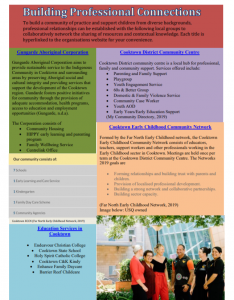19 Building professional connections: Cooktown
Jacynta Hunt
The fact is, we’re time-poor, dispersed, and in many cases, we’re each other’s competition. Given the challenges in our sector, how can we create communities of practice for early years educators interested in multicultural education?
Rationale
A community of practice is a group of professionals with common goals who are collectively developing social capital, nurturing new knowledge, stimulating innovation, or sharing existing knowledge (Culatta, 2011). Underpinning this concept is Vygotsky’s (1978) social constructivist theory that posits learning occurs within a social context. The National Quality Framework (NQF) directs services to engage in professional collaboration, stating that educators should work respectfully and collaboratively, and challenge and learn from each other, recognising each other’s strengths and skills (Australian Children’s Education & Care Quality Authority [ACEQA], 2018). Cooktown is a remote town and as such developing a community of practice can be challenging; however, the above resource presents a range of community networks and organisations that can facilitate building professional relationships for ongoing development.
The Cooktown Early Childhood Community network is an existing group of early childhood educators and associated professionals, who meet to build capacity, provide localised professional development and foster collaborative partnerships (Far North Early Childhood Network, 2019). This group has been included in the resource to address the educators concern about how to build a community of practice for early years educators facing challenges with multicultural education. Any member can raise issues and multicultural education could be tabled as a focus issue for discussion and further exploration. Through this group resources, local knowledge and professional support could be shared. Gungarde Corporation (Gungarde, n.d) and Cooktown District Community Centre (My Community Directory, 2019) are both community centres that offer a range of services beneficial to an early childhood educator.
The Queensland Kindergarten Learning Guideline (QKLG) directs teachers to use intentional teaching practices such as making connections with elders and community members for culturally appropriate resources as well as research and build cultural understanding about Aboriginal and Torres Strait Islander peoples (Queensland Curriculum and Assessment Authority [QCAA], 2018b). Collaborative partnerships, community engagement and relationships with families that reflect the unique geographical, cultural and community context of the service are identified as integral for early childhood services in the National Quality Framework (ACECQA, 2018). As such is it vital that educators are provided with resources to build communities of practices so that they may work together to support children’s learning journeys.


